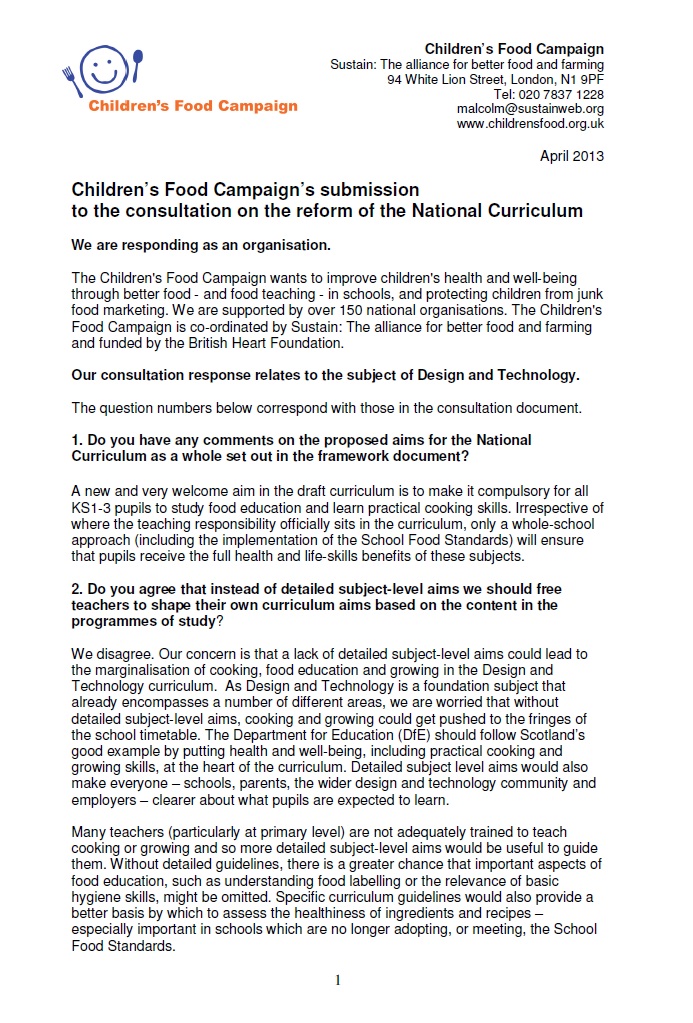The new draft National Curriculum 2013
|
We’re finally on our way to winning the argument that cooking should be an integral part of the school curriculum. The new draft National Curriculum, published earlier this year, places cooking and food education in a prominent position within the Design and Technology syllabus, and makes it a compulsory subject for all 7-14 year olds to study. This would be a great stride forward in equipping young people with the knowledge and skills to make healthier food choices.
But the decision is not yet signed and sealed.
The Department for Education conducted a consultation on the new National Curriculum, which closed on 16 April 2013. Over 560 people used our online tool to submit responses to the consultation, showing their support for the proposed changes and suggesting improvements to the draft programme of study.
The Children's Food Campaign submitted its own reponse: welcoming the references to practical cookery skills; making the case for more and better cooking facilities, equipment and trained teachers, so that no child misses out.
Read our full consultation submission.
|
|||
Background
After years of campaigning for food education, the previous Government finally announced in 2008 that every pupil would receive at least 24 hours of hands-on cookery classes during the first three years of secondary school. This would help to ensure that every child left school able to prepare basic healthy meals for themselves and their families. Ideally, we would like to see at least 24 hours of hands-on cookery classes on the school menu for each of the Key Stages.
The coalition Government has been conducting a review of the National Curriculum. Our concern has been that in a drive to “slim down” the curriculum, this small but valuable provision to ensure that children are taught the skills they need to live healthy lives may be lost. Without basic cooking skills, people are forced to rely on processed ready meals or fast food which is often unhealthy.
Campaigning in Parliament
In June 2011, Zac Goldsmith MP tabled an Early Day Motion calling on the Government to keep cooking lessons on the school curriculum.
"That this House recognises the importance of people having the knowledge, life skills and abilities to make healthy choices for themselves and their families; notes that research shows that practical cooking skills are vital to understanding the importance and make up of a healthy diet; expresses concern that without such skills and knowledge, people do not have the freedom to exercise meaningful control over their diet and food intake and tend to over-rely on pre-prepared or takeaway foods; and so urges the Department for Education to guarantee provision for every secondary school pupil to receive at least 24 hours of practical cooking lessons at Key Stage 3 in its review of the National Curriculum."
79 MPs signed the EDM. Take a look at the list to see if your local MP supported it.
Campaigning to the Department for Education
Thanks to everyone who responded to the Department of Education's initial curriculum consultation in 2011 - hundreds of people sent a response using our online action, sending a strong message about the importance of practical cooking lessons at school. You can read our response here.
Campaigning to the PM
In January 2012 we wrote to the Prime Minister regarding the importance of cooking lessons in schools. It was a joint letter signed by representatives of twenty-nine charities, professional bodies and campaign groups. You can read his response here.
Campaign Supporters
Our campaign to keep kids cooking has attracted widespread support, including that from celebrity chefs Jamie Oliver, Raymond Blanc, Ainsley Harriott and Gary Rhodes, and top medical organisations such as the British Medical Association. Even Liverpool and England captain Steven Gerrard has voiced his support.
As opportunities arise, we will keep pushing the case for practical cooking skills to be an integral part of children's schooling.
Children's Food Campaign: Campaigning for policy changes so that all children can easily eat sustainable and healthy food.


